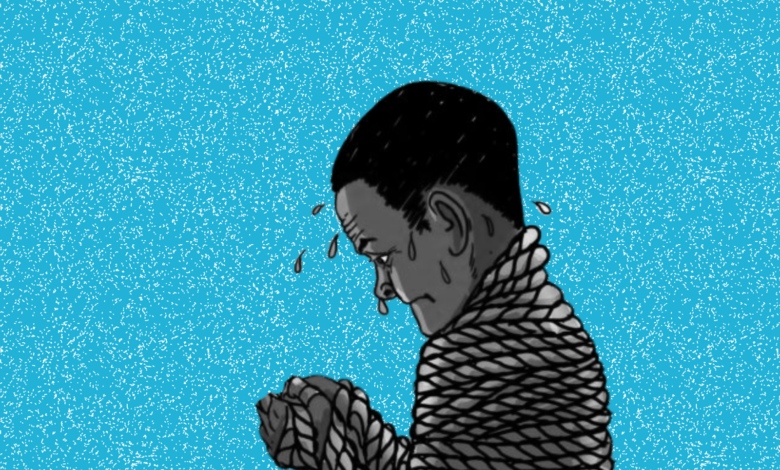The Ignored Mental Health Crisis Among Men And Why It’s Dangerous
Traditional gender roles and societal expectations continue to hinder men from seeking professional mental care in Nigeria. For some victims, the consequences are life-threatening.

As a child growing up in Adamawa state, North East Nigeria, Jeremiah Garvin* was sexually assaulted many times. He hung out with older boys in his village. One of them, whom he was fond of, then started taking him to the stream and farm, where he raped him. He was only about seven years old.
Jeremiah didn’t speak up. His abuser told him he was doing him a favour.
“According to him, I will grow up one day and have a girlfriend or get married, so he wanted to introduce me to sex.”
The abuse continued until he left the village, but the ordeal didn’t end even then.
“I was registered in an all-boys secondary school after completing my primary education. One night while I was asleep, I felt someone unzipping my trousers and suddenly felt a grip on my penis. I jumped out of bed, and I heard footsteps rushing out. When I turned on the lights, there was no one in my room, and that was when my PTSD [Post-Traumatic Stress Disorder] began,” he said.
Many men across the world and in Nigeria face mental health problems caused by a range of issues, including sexual violence. However, a lot of them are not getting the needed help, sometimes due to social stigma associated with vulnerabilities in men.
Mental illness affects people of every gender, and while the specifics may differ, it’s incorrect to assume that men don’t struggle simply because they are often portrayed, or expected, to be strong and silent.
Dr. Nada Abdulwahab, a senior resident of Psychiatry at the University of Maiduguri Teaching Hospital, explained that some of the risk factors when it comes to men’s mental health include genetic predispositions, neurodevelopmental disorders, significant negative childhood experiences, traumatic experiences such as having a chronic medical illness, toxic work or marital relationships, and negative life experiences like the loss of loved ones or financial stress.
“The risks for developing mental illnesses are not significantly different between men and women. Financial loss, stress, or unemployment are even more stressful for men than women,” she said.
For Adamu Noah*, the trigger was the death of his father, which happened when he was five. He was forced to move out of his family house with his mother and sister while a relative took his older brother.
“It didn’t mean a lot to me back then, but later on, while I was growing up, I realised that I had lost someone valuable in life. I somehow felt lonely because I was no longer with my older brother. I was very anxious and kept hoping my mom would never leave, but then, fate struck.”
His mother died when he was 12 years old. He would describe himself as a happy person in his childhood, but the loss of his parents entirely changed his personality. He stopped going out and socialising with friends. He later moved to Nasarawa state to stay with his estranged brother. In a new environment coupled with his underlying depression, he had to battle with fitting in. He later developed acute anxiety.
“I believed that every conversation was an interrogation, and sooner or later, someone was going to ask about my mom, so I hated interactions, and people assumed that I was just an introvert,” he said.
He thought staying mute would help, but it didn’t.
“The pain never went away even though the only way I could hide it was to put on a happy mask and project positivity, but it never worked. I was always sad and anxious about the future.”
In 2014, Adamu’s sister had a baby, so he moved in with her the following year. Another tragedy struck. The baby was diagnosed with cancer in 2017 and died three years later.
“Everything I had been bottling up for years shattered,” he said. “I never imagined that bottling up emotions could be catastrophic. Everything about life was just beyond my control, so I stopped caring and fell to point zero. I’m so down that I don’t even feel like getting up.”
One of the reasons men often refrain from seeking help when faced with mental health challenges is social expectations of masculinity. As a result, they are less likely to talk about their feelings and tend to suffer in silence.
According to Dr Abdulwahab, the health-seeking behaviour of men for any type of illness is usually poorer compared to women. “It is usually even worse for mental illness,” she said. “Research has shown that this has a lot to do with the societal perception of what it means to ‘be a man.”
She added that men are programmed to be strong in dealing with emotional disturbances from childhood. This has been shown to impact the presentation of the commonest mental illnesses like depression and anxiety, thus making it unlikely for men to be diagnosed.
“For example, men would rather become irritable or aggressive than cry or complain about their sadness,” Dr Abdulwahab explained.
She revealed that there are usually more men than women on admission to many mental health institutions, but this is because they are usually brought in by others due to psychotic breakdowns, substance abuse, or crime. “For women, the commonest disorders are depression and anxiety, for which admissions are not necessary most of the time,” she noted.
Depression is one of the world’s most common health conditions. It’s estimated that one in three women and one in five men have an episode of major depression by the age of 65. The figures for suicides are, however, heavily tilted in the opposite direction. Of the nearly 760,000 suicides recorded in 2019, 69 per cent of the victims were men, according to data collected by the World Health Organization.
The experience of Brian Daniel*, in a way, exemplifies this. When he had to repeat a level in school, he shut out the world and preferred to suffer in silence. “I was so devastated that I ended my six-year relationship, and for the first time in my life, suicide crossed my life,” he said.
Christopher Daniel*, who has grappled with anxiety disorder all his life, told HumAngle he has not shared this with anyone. “I’m a man, so I can’t be weak. I’ll be fine,” he shrugged.
Men are far more likely to go into substance use to relieve their distress than to expose their struggles, said Dr Abdulwahab, unlike depressed women who would become uninterested in activities they used to enjoy.
“Men would begin to show interest and pleasure in new, usually destructive activities that lead others to think they have just become wayward.”
She added that more attention is focused on women to the detriment of men’s mental health, further isolating the men. “As mental illness is generally more associated with women, men would rather hide their symptoms or commit suicide than expose them,” she said.
“Society taught me that men don’t cry, so when my mother was murdered in our hometown, I didn’t shed a tear,” said Dominic Samuel*, a resident of Adamawa.
When people thought he had moved on shortly after his mother’s death, Dominic slipped into depression. It affected his mood, composure, interaction with people, and school grades.
“I was always thinking about my mother, and the pressure became worse a few years later when people kept asking me after graduation how I was going to fend for myself and my family. This affected me so much that I stopped going out to avoid questions.”
Dr Abdulwahab said aside from suicide and self-harm, men with mental illnesses also often fall into a habit of substance abuse as a way of getting relief from their symptoms.
She encouraged men to prioritise their mental health.
“They should learn better coping strategies, be encouraged to seek care early, and alter their perception of mental illness as being a weakness,” she advised.
She noted that improved mental healthcare for men must also involve awareness campaigns so that parents, and even more importantly, spouses, understand that mental illness is not peculiar to women, that men are almost equally vulnerable and that the consequences of untreated mental illness in men are astronomically destructive, not just for them, but on families and societies.
“Women, I believe, have an important role in the recognition, care, and support of mental illnesses among men just like men are encouraged to do the same for them,” she said.
Many find that they feel better when they share experiences with those who care about them. Adamu, for example, recently decided to speak about his mental state.
“I talk about it with people who want to listen because whenever I tell someone about it, it shows that I understand about the situation and then gain a new perspective on the need to erase and repaint the punctured canvas of my life,” he said.
He also revealed that throwing himself into physical work was helpful.
*The names of the victims were changed to avoid stigmatisation.
Support Our Journalism
There are millions of ordinary people affected by conflict in Africa whose stories are missing in the mainstream media. HumAngle is determined to tell those challenging and under-reported stories, hoping that the people impacted by these conflicts will find the safety and security they deserve.
To ensure that we continue to provide public service coverage, we have a small favour to ask you. We want you to be part of our journalistic endeavour by contributing a token to us.
Your donation will further promote a robust, free, and independent media.
Donate HereStay Closer To The Stories That Matter




